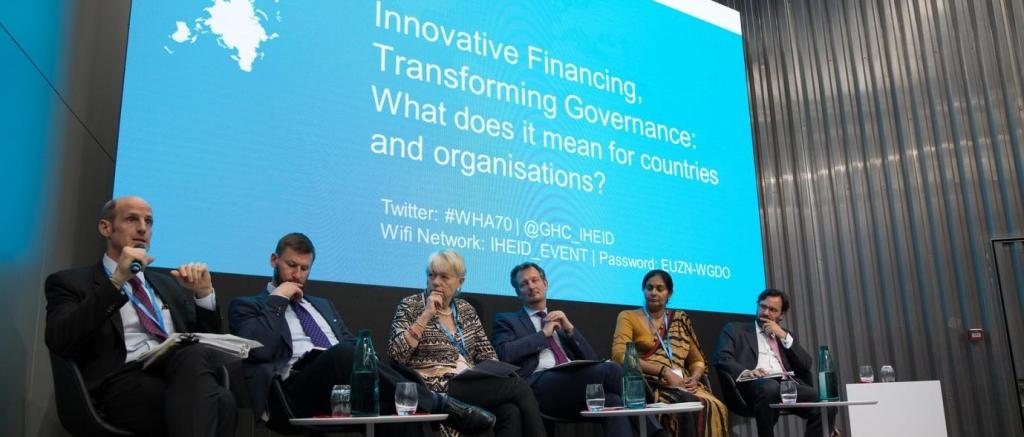With changes in the global political landscape threatening to dramatically impact global health priorities, there is a “danger to discuss financing without governance and governance without financing”. With these words, Professor Ilona Kickbusch signaled that the Global Health Centre’s event “Innovative Financing, Transforming Governance: What does it mean for countries and organizations?”, held on 23 May 2017 on the occasion of the 70th World Health Assembly, aimed at bridging these two debates by bringing together stakeholders from different sectors to explore the current shifts in health financing.
The Global Fund and Gavi are among the organisations that are moving towards a new way of financing based on country ownership of health programmes, in line with the 2030 Agenda for Sustainable Development. Harley Feldbaum from the Global Fund and Santiago Cornejo from Gavi both highlighted that this shift sets the ground for a smoother future transition by avoiding budgetary cliffs once donors retrieve their support and governments take over programme financing. In this regard, increasing domestic financing of health and fostering progressive co-financing models of cooperation have proved to be essential tools to achieve financial sustainability and programme effectiveness, placing global actors as partners rather than substitutes.
Considerations of sustainability and effectiveness are also intimately linked to good financial governance, thereby demanding a move from a programmatic to a cross-sectorial approach. Tim Evans from the World Bank Group advised that development financing strategies should build on three pillars as applied in the Global Financing Facility for Every Women Every Child: smart management of available resources, scaled financing from private and public sectors, and direct resource and finance management by ministries of health. With this aim, the Global Fund’s programmes in countries with a high disease burden and low expense on health have progressively encompassed measures to strengthen domestic health financing.
Susie Perera from the Ministry of Health of Sri Lanka highlighted her country’s early commitment by financing 75 to 80% of immunisation programmes in 2000. She stressed the importance of precise budgetary planning and the use of competitive bidding procedures to achieve affordability. However, Ms. Perera also admitted that tackling new health needs without compromising existing health services remains an important challenge.
From the domestic perspective of donor countries, Hendrik Schmitz-Guinote, Counselor at the Permanent Mission of Germany to the UN, underlined the challenges that they face in relation to the fragmentation of development cooperation initiatives which include bilateral negotiations, global mechanisms, and the establishment of multilateral networks. While some countries have successfully adopted a holistic approach to most of these mechanisms, greater coordination is still needed in cooperation for health development.
Depending on how country ownership is articulated, programme effectiveness and results will have a significant impact on the upcoming replenishments of the Global Fund and Gavi in 2018. The governance challenge of the coming years is in the words of Tim Evans “how development assistance can be much more effective and accountable in terms of strengthening domestic financing across the axes of being smarter, scaled and sustainable”.


